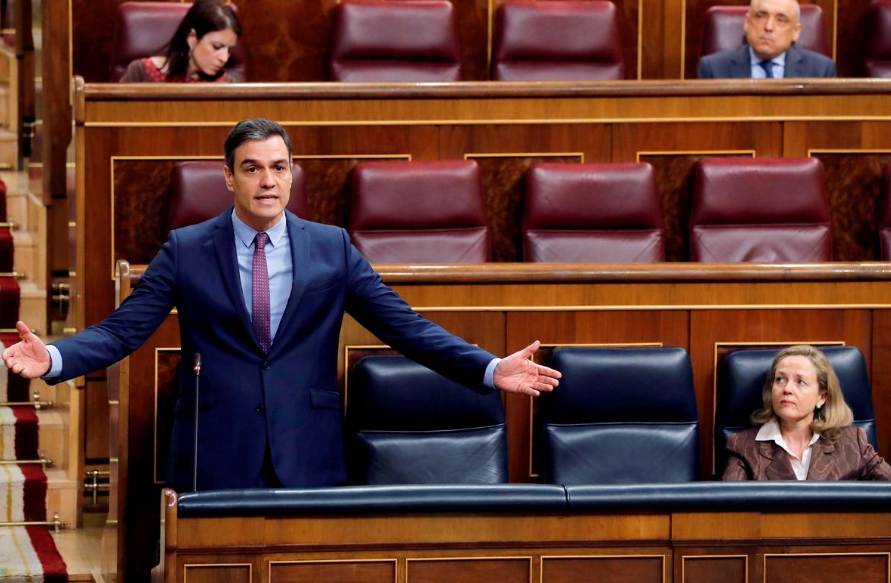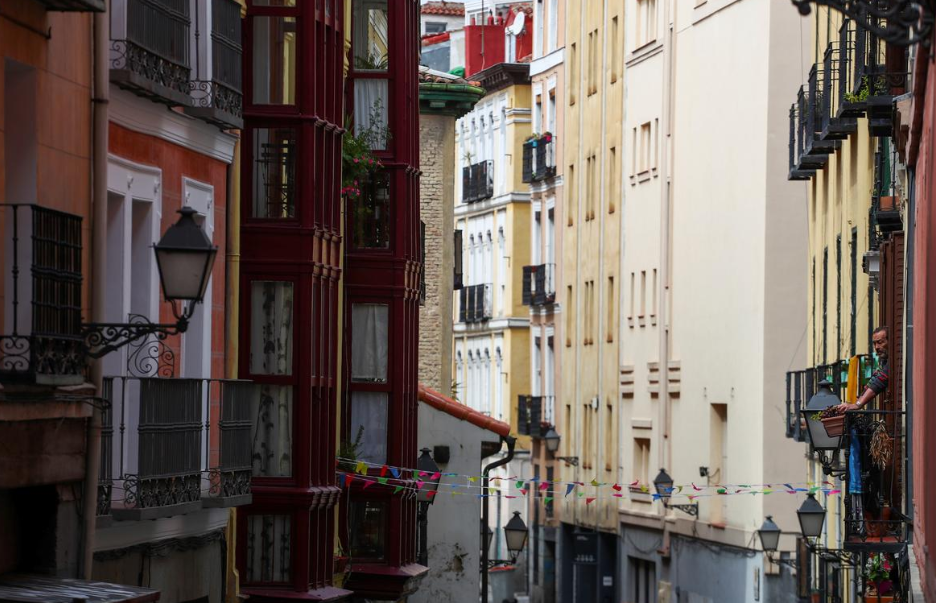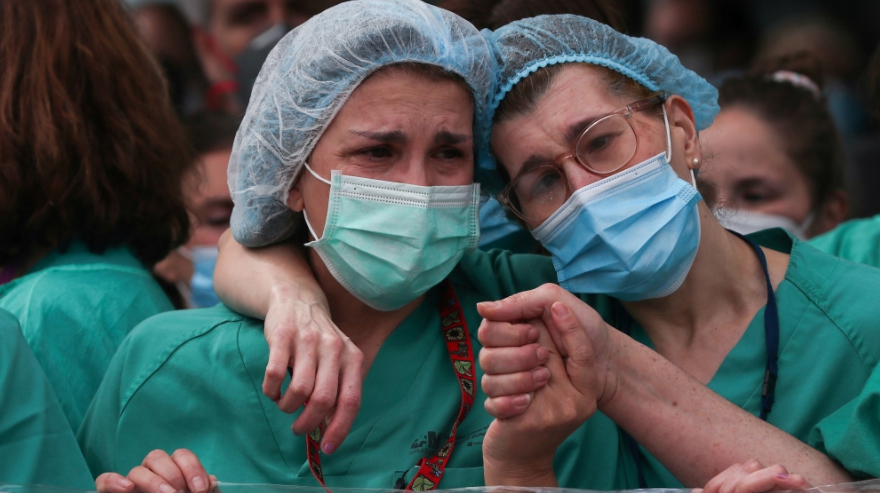Spanish Prime Minister Pedro Sanchez on Wednesday promised more coronavirus testing to try to build on a decline in daily COVID-19 deaths that has allowed Spain to start tentatively reopening its locked-down economy.
Officials hope more testing will give a better indication of the areas where lockdowns can be eased further.
"Spain is already one of the countries making the most daily tests. More than 20,000, and we are increasing the number," Sanchez told a near-empty parliament.

Spanish Prime Minister Pedro Sanchez answers questions as he keeps social distance from Deputy Prime Minister and Economic Affairs Minister Nadia Calvino during a control session on coronavirus disease (COVID-19) at the Parliament in Madrid, Spain, April 15, 2020. /Reuters
Spanish Prime Minister Pedro Sanchez answers questions as he keeps social distance from Deputy Prime Minister and Economic Affairs Minister Nadia Calvino during a control session on coronavirus disease (COVID-19) at the Parliament in Madrid, Spain, April 15, 2020. /Reuters
Spain's daily number of deaths from the coronavirus fell to 523 on Wednesday from 567 the day before, the health ministry said – well below a peak of 950 reached on April 2.
The International Monetary Fund has said Spain's economy is likely to suffer heavily from the pandemic, and the government is keen to reactivate whatever businesses it can as soon as possible, especially ahead of the tourist summer months.
The IMF expected an 8 percent economic slump this year, because of the collapse in tourism and Spain's high proportion of small and medium-sized businesses, with the debt-to-GDP ratio projected to hit 113 percent – its highest level in over a century. It put the 2020 budget deficit at 9.5 percent of GDP, the widest in the euro zone.
On Monday and Tuesday, sectors including construction and manufacturing were allowed to reopen but, with most people still confined to their homes, shops, bars and public spaces will stay closed until at least April 26.
The government said on Wednesday it would begin to hold meetings with opposition leaders from Thursday on the formation of a "pact for the social and economic reconstruction of Spain."
It seeks to unite political parties, unions, companies and regions behind a common economic reconstruction policy and state welfare funding.
The proposal is inspired by the 1977 "Pacts of Moncloa" – named for the presidential palace in Madrid – which aimed to transform the state-run economy along market lines for the post-Franco dictatorship democratic era.
For the lockdown to be eased more broadly, officials say testing for the virus has to be expanded to include people who have mild or no symptoms, to track the spread in more detail.

A man stands on the balcony amid the COVID-19 outbreak in Madrid, Spain, April 15, 2020. /Reuters
A man stands on the balcony amid the COVID-19 outbreak in Madrid, Spain, April 15, 2020. /Reuters
The government also said last week it would carry out mass antibody tests on the blood of 60,000 randomly chosen people over three weeks, to begin identifying those who might in theory now be immune after exposure to the virus.
However, health and virology experts are not yet certain about the quality of such tests, or how much immunity such antibodies might provide.
Spain remains one of the world's worst-affected countries, with only the United States and Italy recording higher cumulative death tolls than the 18,579 reported on Wednesday.
The official tally of cases rose by just over 5,000 to 177,633, although Fernando Simon, the national emergency coordinator, said the expansion of testing had meant more mild or asymptomatic cases were being recorded.
Despite signs that public health authorities are slowly getting on top of the pandemic, healthcare workers have had no respite. In Barcelona, a doctor filed a complaint with police after her vehicle was scrawled with graffiti reading "contagious rat," El Periodico newspaper reported.

Health workers wearing protective face masks react during a tribute for their co-worker Esteban, a male nurse that died of the coronavirus disease, amid the coronavirus disease (COVID-19) outbreak, outside the Severo Ochoa Hospital in Leganes, Spain, April 13, 2020. /Reuters
Health workers wearing protective face masks react during a tribute for their co-worker Esteban, a male nurse that died of the coronavirus disease, amid the coronavirus disease (COVID-19) outbreak, outside the Severo Ochoa Hospital in Leganes, Spain, April 13, 2020. /Reuters
"The number of patients in need of admission has dropped off a great deal," An ICU doctor in Toledo in central Spain told Al Jazeera. "But the overload on the ICU system remains, partly because the average length of admission for coronavirus is around 20 days, so many cases we've had from the start are still there in hospital."
The World Health Organization said on Wednesday that countries should wait at least two weeks before evaluating the impact of loosening their lockdowns and deciding whether to go further.
But Spain, having suffered a heavy blow to growth and employment during the euro zone debt crisis, is under acute pressure to restart its economy.
The IMF said unemployment, already the highest in the European Union, would jump to nearly 21 percent from 14 percent last year.
"Those levels of unemployment are not sustainable," European Central Bank Vice-President Luis de Guindos told Onda Cero radio.
Source(s): Reuters